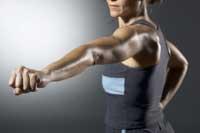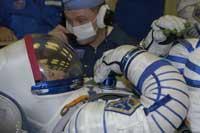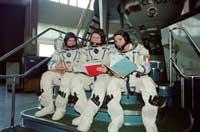Lying in bed as in space

In short stays there are no problems: muscle is lost and in bone tissue there are also problems. However, astronauts are prepared beforehand, and as long as the mission lasts they try to cope with problems, perform physical exercise, and have a special diet to cause the least possible damage to microgravity.
However, prolonged permanence in space can cause serious health problems. If you want to send a manned mission to Mars, for example, you will need to find a way to avoid the damage that microgravity produces in the body.
It is in this context that this research is framed by the French Institute of Medicine and Physiology of Space (MEDES), within the European Space Agency. Twelve women have been lying in bed for two months at Rangueil Hospital in Tolosa and in autumn they will do the same with twelve other volunteers.
In total there are twenty-four women selected for these tests. All of them healthy, twenty-five to forty years old and, above all, with great strength. And it is that the tests are not of all kinds. Lying in bed for two months, with the legs above the head (at a six-degree angle), they have had to endure physiological effects similar to those of astronauts in space.
Calvary of the astronauts

Seeing astronauts playing microgravity, don't be envious, it's nothing nice. With this experiment, women are placed in a similar situation, starting with lying down and accumulating blood and other fluids in the head, increasing the face and causing the headache. One day, as the liquid has been stacked in the upper part of the body, the urine is lost about a liter of liquid. And since there is a lack of stimulation in the ears and feet, dizziness and sometimes vomiting occur.
With the passage of time and without exercise, the muscles of the legs and back begin to atrophy, they are shortened. It loses 2% of the bone mass of the month. The heart muscles also weaken by not having to pump blood against gravity.
In fact, astronauts perform exercises for a couple of hours a day and have an adapted diet, but in a few months they become very weakened, even some are not able to walk when they arrive on Earth.

Therefore, in this experiment, the influence of physical exercise and diet has been studied. The twelve women have been divided into three groups: one to investigate the influence of physical exercise, another to test a diet rich in proteins and, the third, a group that had nothing special to do for control.
For exercise they have used two machines: one is a kind of yo-yo, as the volunteers have called it, to move the legs back and forth. The other tool is like a treadmill, but inside a kind of box, like running down the wall.
With the other group, the special diet, they wanted to show that a diet rich in proteins is sufficient to avoid muscle loss. For this purpose, drinks rich in proteins, especially rich in leucine, which affect the muscles, were used. However, making that diet will not be easy, because it says it has a pretty boring taste.
Women protagonists women protagonists women
Similar research has been carried out with men before. In fact, the number of men who come to space is much greater than that of women: only three women have spent more than six months in space, while 48 in men, 20 of them have completed more than a year. The fact that ESA conducts this research with women means that in the future women will have more importance than they currently have in space travel.

There may not be large physiological differences between women and men, but some experts believe that women may respond better. They also want to see it through this experiment.
Well, the first part of this experiment is over: twelve women have been lying in bed for two months and after a month of rehabilitation they are already at home.
All these women have been satisfied with their experience, they have not been made long, and they have taken great care.
In fact, those who have exercised finished better, while those in the control group suffered pain, balance and had shorter legs and back as contracted. But they have not yet published their main conclusions. In fact, in autumn, the experiment is expected to be repeated with twelve other women. Volunteering?
Published in 7K.
Buletina
Bidali zure helbide elektronikoa eta jaso asteroko buletina zure sarrera-ontzian








